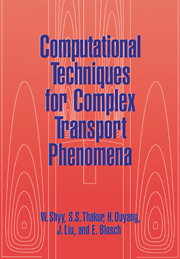Book contents
- Frontmatter
- Contents
- Preface
- 1 Introduction
- 2 Numerical Scheme for Treating Convection and Pressure
- 3 Computational Acceleration with Parallel Computing and Multigrid Method
- 4 Multiblock Methods
- 5 Two-Equation Turbulence Models with Nonequilibrium, Rotation, and Compressibility Effects
- 6 Volume-Averaged Macroscopic Transport Equations
- 7 Practical Applications
- References
- Index
Preface
Published online by Cambridge University Press: 30 March 2010
- Frontmatter
- Contents
- Preface
- 1 Introduction
- 2 Numerical Scheme for Treating Convection and Pressure
- 3 Computational Acceleration with Parallel Computing and Multigrid Method
- 4 Multiblock Methods
- 5 Two-Equation Turbulence Models with Nonequilibrium, Rotation, and Compressibility Effects
- 6 Volume-Averaged Macroscopic Transport Equations
- 7 Practical Applications
- References
- Index
Summary
This book deals with complex fluid flow and heat/mass transport phenomena encountered in natural and human-made environments. These problems, especially those encountered in engineering practice, are often difficult to analyze due to geometric and dynamic complexities, among other factors. Dynamic complexity results from nonlinear physical mechanisms, and geometric complexity is common to virtually all practical devices. To analyze such physical systems, one needs to resolve the wide range of length and time scales as well as the details of the geometric configuration. Consequently, the computational capability required to facilitate such analyses far exceeds that which is available at the present time. Before such a capability can, if ever, become available, one must resort to a more pragmatic approach.
To develop a predictive capability, it is essential to view the complex physical system in its entirety and to strive for appropriate computational and modeling techniques. Quite often, this means that fundamental rigor and engineering approximation need to be reconciled. In the present book, we address a set of computational techniques suitable for analyzing and predicting complex transport phenomena. What we envision is that a design engineer or an analyst can use the techniques presented to conduct investigations and obtain useful information for a given engineering problem in a matter of days rather than weeks or months. In order to achieve this goal, we have purposely avoided taking a deductionist's viewpoint, which tends to concentrate on a specific aspect of the originally complex system in a rigorous manner but with much simplification in terms of the overall complexities.
Information
- Type
- Chapter
- Information
- Publisher: Cambridge University PressPrint publication year: 1997
